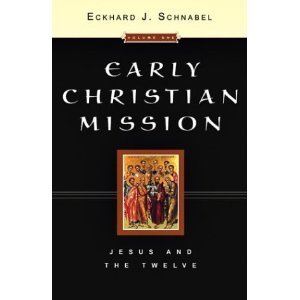Avoiding Romanticized Views of the Early Church's Mission
 The most comprehensive study on the history of the mission of the early church is Echkard Schnabel's magisterial two-volume work Early Christian Mission. At the outset, Schnabel warns against the typical approach among evangelicals which is "unconsidered, and sometimes naive or romanticized" (xxiii).
The most comprehensive study on the history of the mission of the early church is Echkard Schnabel's magisterial two-volume work Early Christian Mission. At the outset, Schnabel warns against the typical approach among evangelicals which is "unconsidered, and sometimes naive or romanticized" (xxiii).
He explains:
Views that fail to take into account the historical and social conditions of life in the first century are potentially problematic. For example, the view that early Christians recognize the significance of "small groups" or of "house churches" fails to recognize the fact that outside of local synagogues Christians had no other option to meet in private homes whose largest rooms could accommodate about forty people.
Another example is the view, naive despite the notice in Acts 4:32, that the early Christians were a united group of activists, uniform in their theology and thick as thieves in their relationships, who were willing and eager to subordinate differences of opinion and behavior to the missionary mandate. This view fails to recognize, for example, that the conflict whose solution is recorded in Acts 15 evidently was not supported by all missionaries based in Jerusalem, or that Paul was willing to separate from missionary coworkers as a result of differences of opinion, or that churches recently established by Paul were visited by Jewish-Christian missionaries whose goal was to influence them theologically and institutionally.
Or note the romantic view that the organization of the early Christian missionary work among non-Jews corresponds, at least in general terms, to the foreign missions endeavors of one's denomination or missionary society. Before we can develop "lessons" for Christians today, we need to heed the facts as they present themselves in the New Testament. As far as mission and evangelism are concerned, this has not always happened. (xxiii-xxiv)
Pastors, students, interested laypeople–these two volumes are important reference works to have on your shelves.



